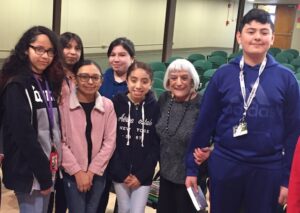My mother, Edith Schumer,  was a Holocaust refugee who fled Nazi Germany as a 12-year-old unaccompanied minor. She never said a word about her past – even though the anguish and abandonment she felt in fleeing her village alone had defined her life.
was a Holocaust refugee who fled Nazi Germany as a 12-year-old unaccompanied minor. She never said a word about her past – even though the anguish and abandonment she felt in fleeing her village alone had defined her life.
She lost everything in 1938: her home, her family, her language, her loyalties, her identity. The way she coped was to never speak of her early life, and, as a child, I quickly learned that I was never to ask. Her past was like a busy intersection, which I was to avoid at all costs. As far as I knew, she had no mother, no father, no childhood friends, no family legends, no religious traditions. For decades, I felt I hardly knew her or her history and, without that knowledge, I had only a limited understanding of myself.
To my surprise, when I was six months pregnant with my third child, my mother decided she wanted to visit her small German town together to reclaim her past. Finally, the wall of silence began to crumble. On that first trip in 1990, we met the people she had known, saw her family’s expropriated home, stepped back in time at the desecrated Jewish cemetery where our ancestors were buried.
The more I learned, the more I understood her. And I began to see the universality of her story: a traumatized child, an immigrant without family or past, haunted by all she had lost.
It became clear that this was a story I could and should tell. So I wrote my first book, Motherland, combining her scraps of memory with moments from our journey into a family quilt of history.
“Who’s going to read this?” she asked. “Why would anyone care?”
But they did. As the book caught on, I began to speak about it in public. To my surprise, my mother started to come along, always taking a seat in the very back row. Hearing her story told and retold, she was freed of its terror, and she gradually started to sit closer to the stage. I began to measure her comfort level with her story by the seat she chose.
One day, I said to the audience, “My mother is here with us today.” As the audience gasped and turned to look, she stood, walked to the stage, and began answering questions. A standing ovation was her reward.
Over time, her real reward was a new peace of mind. By sharing my mother’s story, we unwittingly brought about her recovery. I had provided her with the narrative trauma victims need to rise above its ravages. Our audiences – standing one by one, over and over, to share their own feelings of sympathy – joined me as her witnesses.
Over the years, we’ve spoken in hundreds of schools. Ironically, the very subject she avoided when I was a child eventually became a source of pride and identity for her.
Mom turned 98 last week, and a middle school teacher sent her this moving birthday greeting: “Your life is teaching profound lessons to so many! I am delighted to know you through your daughter!!! May you always be surrounded by love, joy, and peace! Today, I celebrate the precious gift of your life!!!”
